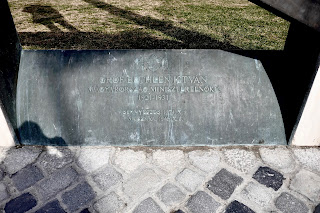I have walked past this statue many times without trying to find out more about its subject, Count Istvan Bethlen de Bethlen. The statue itself didn't appeal to me and I assumed, from the fact that the inscription states that Bethlen died in Moscow, that he was a Communist crony.
What a mistake, what a lesson that one should never jump to conclusions. Bethlen, it turns out, was one of the more admirable politicians of 20th century Hungary.
Bethlen was elected to parliament in Hungary in 1901. In 1919, he served as a representative of the Hungarian government at the Paris Peace Conference.
When Béla Kun seized power in Hungary and established a Hungarian Soviet Republic, Bethlen quickly returned from Paris to Hungary to assume leadership of the anti-communist "white" government based in Szeged. After the "white" forces defeated Kun, Bethlen again took a seat in the parliament, and worked in alliance with the conservative factions there.
In 1920, after an attempt to return Charles I of Austria/IV of Hungary to the throne of Hungary was defeated, Miklós Horthy was named Regent in Hungary. After a second attempt by Charles was also unsuccessful, Horthy asked Bethlen to form a government, hoping to eliminate the possibility of further governmental upheaval. Bethlen became Prime Minister of Hungary in April, 1921. He and Horthy, rather unwisely, did get involved in negotiations with Charles I of Austria/IV of Hungary later that year, with the idea that his monarchy be restored - I hope one day to find a statue of Charles so that I can recount the absurd mess of that attempt, along with Charles's earlier ones.
Anyway, in 1922 Bethlen founded the Party of National Unity and managed to create a durable coalition between the wealthy industrialists in Budapest and the old Hungarian rural gentry. He also managed to reach agreement with the labour unions and get them to support the government, thus eliminating another source of domestic dissent.
While there is something called the Franc Affair that Bethlen almost certainly had a hand in, while he did enter into a Treaty of Friendship with Mussolini's Italy, his political efforts checked the rise of Fascism in Hungary for at least a decade, according to Wikipedia. Certainly, his removal from the Prime Ministership was caused by a shift to the right in Hungarian politics due to the Great Depression, and those who followed him were extremists - particularly Gyula Gombos de Jakfa, who was the second person after Bethlen to take over as Prime Minister in 1932; Gombos de Jakfa was a Fascist and an avowed antisemite.
Bethlen stood out as one of the few voices in Hungary actively opposed to an alliance with Nazi Germany. Late in the war, he tried without success to negotiate a separate peace with the Allied powers. When the Soviets moved in, the Hungarian communists re-emerged from the woodwork. Bethlen was a threat, having proved himself a man who could unite disparate political forces. In March 1945, he was arrested by the Soviets and taken to Moscow. He died there in prison on 5 October 1946.
Bethlen and the Hungarian delegation - to what? - in the Hague














No comments:
Post a Comment